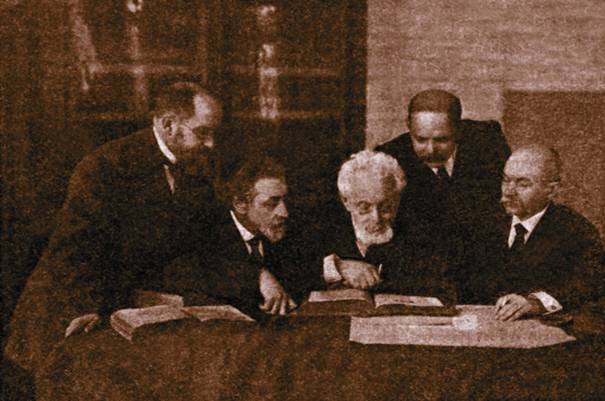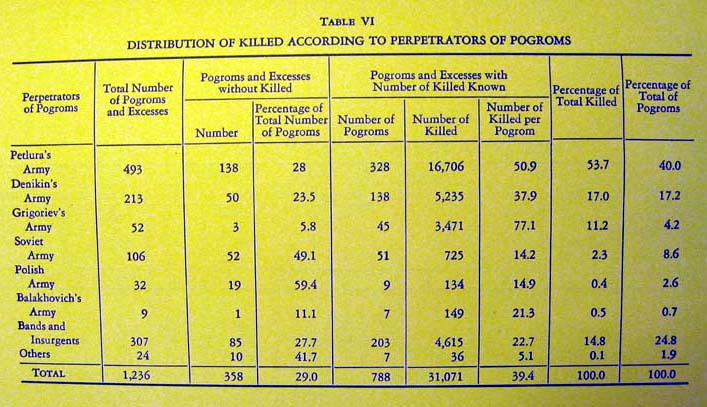|
Elias Tscherikower
Elias Tcherikower (Yiddish: אליהו טשעריקאָװער; July 31, 1881 – August 8, 1943), also known as Eliahu Tcherikover, Elye Tsherikover, Eliahu Tcherikower, Elias Tscherikower, and I. M. Cherikover, was a Russian-born Jewish historian of Judaism or the Jewish people. Biography Tcherikower was born and raised in Poltava (Ukraine), in the Russian Empire, where his father was a pioneer of the Hovevei Zion movement. He attended gymnasium in Odessa, and went on to university in Saint Petersburg. His participation in the Russian revolutionary movement led to his arrest at a Menshevik meeting during the 1905 revolution,Moss, Kenneth B. (2010, October 29).Tsherikover, Elye" ''YIVO Encyclopedia of Jews in Eastern Europe''. Retrieved 2015-07-04. after which he spent a year in prison.Karlip, Joshua M. (2008). "Between martyrology and historiography: Elias Tcherikower and the making of a pogrom historian." ''East European Jewish Affairs'', 38(3), p. 257-280. doi: 10.1080/1350167 ... [...More Info...] [...Related Items...] OR: [Wikipedia] [Google] [Baidu] |
Poltava
Poltava (, ; uk, Полтава ) is a city located on the Vorskla River in central Ukraine. It is the capital city of the Poltava Oblast (province) and of the surrounding Poltava Raion (district) of the oblast. Poltava is administratively incorporated as a city of oblast significance and does not belong to the raion. It has a population of History It is still unknown when Poltava was founded, although the town was not attested before 1174. However, for reasons unknown, municipal authorities chose to celebrate the city's 1100th anniversary in 1999. The settlement is indeed an old one, as archeologists unearthed a Paleolithic dwelling as well as Scythian remains within the city limits. Middle Ages The present name of the city is traditionally connected to the settlement Ltava which is mentioned in the Hypatian Chronicle in 1174. [...More Info...] [...Related Items...] OR: [Wikipedia] [Google] [Baidu] |
Mendele Mocher Sforim
Mendele Mocher Sforim ( yi, , he, מנדלי מוכר ספרים, also known as Moykher, Sfarim; lit. "Mendele the book peddler"; January 2, 1836, Kapyl – December 8, 1917 .S. Odessa), born Sholem Yankev Abramovich ( yi, , russian: Соломон Моисеевич Абрамович, translit=Solomon Moiseyevich Abramovich) or S. J. Abramowitch, was a Jewish author and one of the founders of modern Yiddish and Hebrew literature. Youth Mendele was born to a poor Lithuanian Jewish family in Kapyl in Minsk Governorate. His father, Chaim Moyshe Broyde, died shortly after Mendele's bar mitzvah. He studied in yeshiva in Slutsk and Vilna until he was 17; during this time he was a day-boarder under the system of '' Teg-essen'', barely scraping by, and often hungry. Mendele traveled extensively around Belarus, Ukraine and Lithuania at the mercy of an abusive beggar named Avreml Khromoy (Russian for "Avreml the Lame"); Avreml would later become the source for the title characte ... [...More Info...] [...Related Items...] OR: [Wikipedia] [Google] [Baidu] |
Simon Dubnow
Simon Dubnow (alternatively spelled Dubnov, rus, Семён Ма́ркович Ду́бнов, Semyon Markovich Dubnov, sʲɪˈmʲɵn ˈmarkəvʲɪtɕ ˈdubnəf; yi, שמעון דובנאָװ, ''Shimen Dubnov''; 10 September 1860 – 8 December 1941) was a Jewish-Russian historian, writer and activist. Life and career In 1860, Simon Dubnow was born Shimon Meyerovich Dubnow (Шимон Меерович Дубнов) to a large poor family in the Belarusian town of Mstsislaw (Mahilyow Voblast). A native Yiddish speaker, he received a traditional Jewish education in a ''heder'' and a ''yeshiva'', where Hebrew was regularly spoken. Later Dubnow entered into a ''kazyonnoye yevreyskoe uchilishche'' (state Jewish school) where he learned Russian. In the midst of his education, the May Laws eliminated these Jewish institutions, and Dubnow was unable to graduate; Dubnow persevered, independently pursuing his interests in history, philosophy, and linguistics. He was particularly ... [...More Info...] [...Related Items...] OR: [Wikipedia] [Google] [Baidu] |
Nahum Gergel
Nahum Gergel (April 4, 1887 – November 18, 1931) was a Jewish rights activist, humanitarian, sociologist, and author in Yiddish. Nahum Gergel is best known for his thorough statistical studies of anti-Jewish atrocities ( pogroms) that took place in Ukraine in 1918–1921. Gergel received a traditional Jewish education, then studied law in Kiev. In 1914 he graduated from Kiev University and moved to St. Petersburg where he became active politically, as a Jewish rights activist and as a humanitarian. He lived in Russia, Ukraine, and eventually Germany where he emigrated in 1921. Gergel died at the age of 44 of a sudden heart attack, and was buried in the Weißensee cemetery in Berlin in 1931. His family then moved back to Ukraine prior to Hitler’s ascent to power. Jewish aid organizations In January 1915 Gergel joined the EKOPO (Jewish Committee for the Aid of War Victims), and in September 1915 he was elected its chairman. Starting September 1916 Gergel worked in the EKOPO ... [...More Info...] [...Related Items...] OR: [Wikipedia] [Google] [Baidu] |
Jacob Lestschinsky
Jakob Lestschinsky (also ''Jacob Lestschinsky'', ''Yankev Leshtshinski'', ''Yankev Leshchinski'', לשצ'ינסקי, יעקב; August 26, 1876 in Horodysche, Ukraine – March 22, 1966 in Jerusalem) was a Jewish statistician and sociologist who wrote in Yiddish, German, and English. He specialized in Jewish demography and economic history. And during the February Revolution in Russia he helped found the United Jewish Socialist Party and served on the editorial board of ''Naye Tsayt'', its official journal.And in 1938 he went to the United States. During the war he lived in New York, and worked with the Institute of Jewish Affairs of the World Jewish Congress. Life Born near Kyiv, he received a traditional Jewish education. As a teenager, he was deeply moved by Hebrew writer Ahad Ha'am. After university study in Switzerland for a decade, he returned to Russia in 1913. He was involved in various Zionist and socialist political activities, such as the Zionist Socialist Workers Pa ... [...More Info...] [...Related Items...] OR: [Wikipedia] [Google] [Baidu] |
Pogrom
A pogrom () is a violent riot incited with the aim of massacring or expelling an ethnic or religious group, particularly Jews. The term entered the English language from Russian to describe 19th- and 20th-century attacks on Jews in the Russian Empire (mostly within the Pale of Settlement). Similar attacks against Jews which also occurred at other times and places retrospectively became known as pogroms. Sometimes the word is used to describe publicly sanctioned purgative attacks against non-Jewish groups. The characteristics of a pogrom vary widely, depending on the specific incident, at times leading to, or culminating in, massacres. Significant pogroms in the Russian Empire included the Odessa pogroms, Warsaw pogrom (1881), Kishinev pogrom (1903), Kiev pogrom (1905), and Białystok pogrom (1906). After the collapse of the Russian Empire in 1917, several pogroms occurred amidst the power struggles in Eastern Europe, including the Lwów pogrom (1918) and Kiev Pogroms (1 ... [...More Info...] [...Related Items...] OR: [Wikipedia] [Google] [Baidu] |
History Of The Jews In Ukraine
The history of the Jews in Ukraine dates back over a thousand years; Jewish communities have existed in the territory of Ukraine from the time of the Kievan Rus' (late 9th to mid-13th century). Some of the most important Jewish religious and cultural movements, from Hasidism to Zionism, rose either fully or to an extensive degree in the territory of modern Ukraine. According to the World Jewish Congress, the Jewish community in Ukraine constitutes the third-largest in Europe and the fifth-largest in the world. The actions of the Soviet government by 1927 led to a growing antisemitism in the area.Сергійчук, В. Український Крим К. 2001, p.156 Total civilian losses during World War II and the Reichskommissariat Ukraine, German occupation of Ukraine are estimated at seven million. More than one million Soviet Jews, of them around 225,000 in Belarus, were shot and killed by the Einsatzgruppen and by their many local Ukrainian supporters. Most of them wer ... [...More Info...] [...Related Items...] OR: [Wikipedia] [Google] [Baidu] |
Ukraine
Ukraine ( uk, Україна, Ukraïna, ) is a country in Eastern Europe. It is the second-largest European country after Russia, which it borders to the east and northeast. Ukraine covers approximately . Prior to the ongoing Russian invasion, it was the eighth-most populous country in Europe, with a population of around 41 million people. It is also bordered by Belarus to the north; by Poland, Slovakia, and Hungary to the west; and by Romania and Moldova to the southwest; with a coastline along the Black Sea and the Sea of Azov to the south and southeast. Kyiv is the nation's capital and largest city. Ukraine's state language is Ukrainian; Russian is also widely spoken, especially in the east and south. During the Middle Ages, Ukraine was the site of early Slavic expansion and the area later became a key centre of East Slavic culture under the state of Kievan Rus', which emerged in the 9th century. The state eventually disintegrated into rival regional po ... [...More Info...] [...Related Items...] OR: [Wikipedia] [Google] [Baidu] |
Kyiv
Kyiv, also spelled Kiev, is the capital and most populous city of Ukraine. It is in north-central Ukraine along the Dnieper, Dnieper River. As of 1 January 2021, its population was 2,962,180, making Kyiv the List of European cities by population within city limits, seventh-most populous city in Europe. Kyiv is an important industrial, scientific, educational, and cultural center in Eastern Europe. It is home to many High tech, high-tech industries, higher education institutions, and historical landmarks. The city has an extensive system of Transport in Kyiv, public transport and infrastructure, including the Kyiv Metro. The city's name is said to derive from the name of Kyi, one of its four legendary founders. During History of Kyiv, its history, Kyiv, one of the oldest cities in Eastern Europe, passed through several stages of prominence and obscurity. The city probably existed as a commercial center as early as the 5th century. A Slavs, Slavic settlement on the great trade ... [...More Info...] [...Related Items...] OR: [Wikipedia] [Google] [Baidu] |
Russian Revolution
The Russian Revolution was a period of Political revolution (Trotskyism), political and social revolution that took place in the former Russian Empire which began during the First World War. This period saw Russia abolish its monarchy and adopt a socialist form of government following two successive revolutions and a bloody civil war. The Russian Revolution can also be seen as the precursor for the other European revolutions that occurred during or in the aftermath of WWI, such as the German Revolution of 1918–1919, German Revolution of 1918. The Russian Revolution was inaugurated with the February Revolution in 1917. This first revolt focused in and around the then-capital Petrograd (now Saint Petersburg). After major military losses during the war, the Russian Army had begun to mutiny. Army leaders and high ranking officials were convinced that if Nicholas II of Russia, Tsar Nicholas II abdicated, the domestic unrest would subside. Nicholas agreed and stepped down, usher ... [...More Info...] [...Related Items...] OR: [Wikipedia] [Google] [Baidu] |
Ber Borochov
Dov Ber Borochov (russian: Дов-Бер Борохов; 3 July 1881 – 17 December 1917) was a Marxist Zionist and one of the founders of the Labor Zionist movement. He was also a pioneer in the study of the Yiddish language. Biography Dov Ber Borochov was born in the town of Zolotonosha, Russian Empire (now in Ukraine), and grew up in nearby Poltava. His mother and father were both teachers. As an adult he joined the Russian Social Democratic Labor Party but was expelled when he formed a Zionist Socialist Workers Union in Yekaterinoslav. After being arrested by the Russian authorities he left for the United States. Subsequently, he helped form the Poale Zion party and devoted his life to promoting the party in Russia, Europe, and America. When the Russian social democrats came to power, Borochov returned to Russia in March 1917 to lead the Poale Zion. He became ill and died in Kiev of pneumonia in December 1917. Ideology Borochov became highly influential ... [...More Info...] [...Related Items...] OR: [Wikipedia] [Google] [Baidu] |




.jpg)

